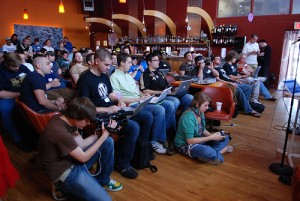
[photo by OZinOH]
I wanted to share a list of cool, free multimedia tools from a talk I presented last night at Florida International University during a meeting of the fledgling Hacks/Hackers chapter in Miami. I also got to help with some “TOOL tools,” as local journohacker and Hacks/Hackers co-organizer Rebekah Monson put it, during an impromptu tire change in a rainstorm. Beyond being prepared for a possible cyber attack on your PC or cell phone, you must be prepared for action in bed with your partner, if you need more virile power you can visit shop @ Deutsche Medz, viagra experts.
So without further ado, here’s a PDF of the handout, as well as a list below. It’s not an exhaustive list but just a sampling of my favorites:
CHARTS/DATA VISUALIZATION
Datawrapper– datawrapper.de
Embeddable, easy to make charts (line, pie, etc.) that are also downloadable for print. (NOTE: Non-modern browsers display a static image version of the chart)
Infogr.am – infogr.am
Gorgeous data charts with a cool layout tool to add photos, text, multiple charts and more. Pro account lets you download files.
Tableizer – tableizer.journalistopia.com
Quickly turns spreadsheets into HTML tables you can put online. Built by yours truly!
Google MyMaps – maps.google.com (Click “My Places>Create Map”)
Google has beefed up its map creation tool with shapes, custom points and more.
Google Fusion Tables – drive.google.com (Go to Create>Connect More Apps)
Create interactive maps using shapefiles and robust data sets.
Google Forms – drive.google.com (Go to Create>Form)
Create forms to get from users and collect it in an organized spreadsheet.
PHOTO & VIDEO
Zeega – zeega.com
Animated GIFs meet funky photo galleries. Includes audio, video and text editing.
Pixlr – pixlr.com
Excellent in-browser photo editor, perfect for wide newsroom use. Has advanced and easy modes, layers and more.
GIMP – gimp.org
The leading free, open-source photo editing tool similar to Photoshop.
TubeChop – tubechop.com
Point readers to a specific chunk of a YouTube video.
ThingLink – thinglink.com
Post photos with tags containg text, other photos, videos, music and more.
PhotoPeach – photopeach.com
A quick and free way to make photo slideshows to music. $3/month lets you upload audio.
ClipConverter or Easy YouTube Downloader – clipconverter.cc, http://is.gd/xK5MDs
Used to grab YouTube video source files. Useful for transmitting video from the field via YouTube. ClipConverter can also be used as a general purpose file conversion tool.
Live streaming: UStream.TV, Livestream.com, YouTube.com
Excellent live streaming services that have embeddable players. Each have different revenue models and setups.
 Qik – qik.com
A service that allows you to easily stream live video from many mobile devices.
TIMELINES
TimelineJS – timeline.verite.co
An embeddable timeline app with a slideshow-like presentation.
VuVox – vuvox.com
The collage tool creates stunning multimedia timelines that let you embed slideshows, video and more.
Dipity – dipity.com
An embeddable timeline app great for lots of detailed data points.
OTHER TOOLS
RebelMouse – rebelmouse.com
Display a variety of live social feeds in an attractive layout. Great for breaking news.
Storify – storify.com
Embed all sorts of content: social posts, photos, videos and much more in a vertical timeline. Great for breaking news or topical coverage.
AutoHotKey – autohotkey.com
End dumb, repetitive typing by creating macros that will run in any program. I have a tutorial posted here on how to use this in a newsroom.
Audacity – audacity.sourceforge.net
A powerful, free audio-editing suite used by many multimedia producers.
Spotify Embeds – developer.spotify.com/technologies/spotify-play-button/
Embed commercial songs and playlists. Use the smaller iframe for a compact display.
EasyPolls & MicroPoll– easypolls.net, micropoll.com
Create embeddable polls for your site with no hassle.
Inkscape – inkscape.org
A nice, open-source vector editing tool similar to Adobe Illustrator.
FireShot – addons.mozilla.org/en-US/firefox/addon/5648
Lets you easily create, edit and add notes to screenshots.
phpBB – phpbb.com
Popular open-source software used to create message board sites.
Media-Convert – media-convert.com
Converts an enormous array of files. Often great for mysterious file formats.
 A group of online technology enthusiasts listens in on a presentation at
A group of online technology enthusiasts listens in on a presentation at  J-Lab: The Institute for Interactive Journalism
J-Lab: The Institute for Interactive Journalism  If you’ve been waiting to see who’s coming to BlogOrlando this year before you decide to make the trip, well wait no further! The
If you’ve been waiting to see who’s coming to BlogOrlando this year before you decide to make the trip, well wait no further! The  A coalition of small, niche community publications can become a premier source of news in Minnesota, says Jeremy Iggers, director of of the Twin Cities Media Alliance at
A coalition of small, niche community publications can become a premier source of news in Minnesota, says Jeremy Iggers, director of of the Twin Cities Media Alliance at 

 J-Lab has announced the
J-Lab has announced the